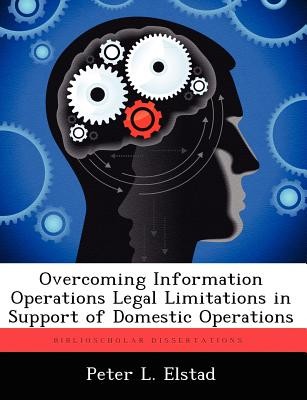
- We will send in 10–14 business days.
- Author: Peter L Elstad
- Publisher: BiblioScholar
- ISBN-10: 124928421X
- ISBN-13: 9781249284215
- Format: 18.9 x 24.6 x 0.5 cm, softcover
- Language: English
- SAVE -10% with code: EXTRA
Overcoming Information Operations Legal Limitations in Support of Domestic Operations (e-book) (used book) | bookbook.eu
Reviews
Description
Overcoming information operations legal limitations in support of domestic operations is a stumbling block to applying information effectively in this environment. Current US Title 10 restrictions limit the use of certain assets (e.g. Psychological Operations PSYOP assets) against the US domestic population during times of crisis. The new FM 3-0, Operations, states that information is an element of combat power and this construct in theory allows all Army information tasks to be legally and equally applied in domestic operations. This thesis attempts to answer the question, "can Army information tasks be legally and doctrinally applied in domestic operations?" The Smith -- Mundt Act of 1948, Posse Comitatus Act, Insurrection Act of 1807, Stafford Act, Title 10 of the Federal Code, and Title 32 of the Federal Code all impose legal limitations on the use of military forces in domestic operations. Army information tasks appear to fall in a gray area which requires interpretation as whether or not they can be used in domestic operations. By using content analysis, this thesis attempted to examine a broad spectrum of written opinion from various perspectives (legislative, executive branch, Department of Defense, Department of the Army, and academic/civilian). This was an attempt to get an understanding of what the overall collective opinions were regarding IO support in domestic operations. The findings indicate the collective thought (or opinion) of the 'Information Community' that it may be possible to apply Army information tasks legally in domestic operations.
EXTRA 10 % discount with code: EXTRA
The promotion ends in 18d.18:38:51
The discount code is valid when purchasing from 10 €. Discounts do not stack.
- Author: Peter L Elstad
- Publisher: BiblioScholar
- ISBN-10: 124928421X
- ISBN-13: 9781249284215
- Format: 18.9 x 24.6 x 0.5 cm, softcover
- Language: English English
Overcoming information operations legal limitations in support of domestic operations is a stumbling block to applying information effectively in this environment. Current US Title 10 restrictions limit the use of certain assets (e.g. Psychological Operations PSYOP assets) against the US domestic population during times of crisis. The new FM 3-0, Operations, states that information is an element of combat power and this construct in theory allows all Army information tasks to be legally and equally applied in domestic operations. This thesis attempts to answer the question, "can Army information tasks be legally and doctrinally applied in domestic operations?" The Smith -- Mundt Act of 1948, Posse Comitatus Act, Insurrection Act of 1807, Stafford Act, Title 10 of the Federal Code, and Title 32 of the Federal Code all impose legal limitations on the use of military forces in domestic operations. Army information tasks appear to fall in a gray area which requires interpretation as whether or not they can be used in domestic operations. By using content analysis, this thesis attempted to examine a broad spectrum of written opinion from various perspectives (legislative, executive branch, Department of Defense, Department of the Army, and academic/civilian). This was an attempt to get an understanding of what the overall collective opinions were regarding IO support in domestic operations. The findings indicate the collective thought (or opinion) of the 'Information Community' that it may be possible to apply Army information tasks legally in domestic operations.


Reviews